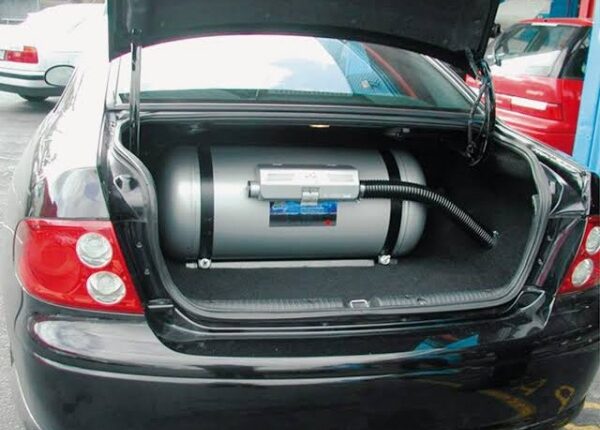
FG STARTS FREE CNG CONVERSION FOR COMMERCIAL VEHICLES
The Federal Government has commenced the free conversion of petrol and diesel-powered commercial vehicles to compressed natural gas in a bid to cut the cost of transportation nationwide.
It started the exercise in Abuja and Lagos, urging commercial transport owners to key into the scheme by bringing their vehicles to be converted, stressing that the use of CNG would reduce the cost of transportation by over 40 per cent.
Officials of the Federal Ministry of Information and National Orientation, along with those from the Presidential Compressed Natural Gas Initiative, monitored the commencement of the exercise at the Federal Capital Territory, as transporters brought in their vehicles to be converted.
The Federal Government had earlier declared on Thursday that the conversion of petrol and diesel-powered commercial vehicles to run on compressed natural gas was going to be free of charge.
It made this public in Abujall after signing agreements with various companies involved in the conversion of petrol and diesel-powered vehicles to operate on CNG.
It said commercial transporters under their different unions, including the Road Transport Employers Association of Nigeria, the National Union of Road Transport Workers, and the and the Nigerian Association of Road Transport Owners, among others, would benefit from this.
The Programme Director/Chief Executive, Presidential Compressed Natural Gas Initiative, Michael Oluwagbemi, had disclosed this to journalists after the government agency signed agreements with various companies in Abuja.
Speaking at one of the conversion centres during the commencement of the exercise on Friday, the Sales and Business Development Manager, P-CNGI, Lara Ogunleye, said, “Today (Friday), we are at the NASENI Portland Conversion Centre where we have started the conversion for commercial vehicles. The first one that we have seen is from the e-hailing cabs that are part of the conversion scheme.
“The e-hailing cabs are supposed to pay a fraction of the cost of the conversion, while the transport associations have 100 per cent conversion free charge, and the cost of the kits is also 100 per cent free. Today we have started with the e-hailing cabs and the scheme is going to be done across the federation.
“We are starting with Abuja and Lagos. We will keep rolling it out and the announcements will be made as we keep moving to each of the states.”
On the number of cars to be converted nationwide, she said, “We intend to convert over a million cars within the first 12 months. So the conversion cost is free for transport associations, as well as the cost of kits.
“For e-hailing cabs, they are paying a fraction of the cost of the kits, and they are paying 100 per cent of the cost of conversion.”
She added that, “The fraction depends on the location. Right now, we are in Abuja, and they have their own fraction. For private individuals, the cost of conversion differs. It depends on the type of car and the size of the cylinder that goes into your vehicle. But it ranges from N700,000 to about N1.8m.”
Ogunleye urged transporters to take advantage of the offer, as this would help in crashing the cost of transportation across the country.
“So for transport owners across the federation, the cost of conversion is 100 per cent free for you.
“Please go to your transport associations, key in, and as we go to your locations, we will register you, take all your details, advise on the conversion centres that you can go to, present your vehicle, and get a free conversion. All of this is courtesy of the President,” she explained.
Speaking at another conversion centre in Abuja, Udechukwu Ejike, a Bolt driver, explained why he decided to convert his car from the use of petrol to CNG.
“I’m doing this because petrol is far higher in cost than CNG. For instance, in a day I buy petrol of about N25,000 to N30,000, but with CNG I’m to spend between N3,500 and N7,000. I’m happy with this initiative, and I advise everyone to consider converting their vehicles from petrol usage to CNG. It is very cheap and good,” he stated.
Other commercial transporters at the centres alluded to the position of Ejike as they expressed optimism that more of their colleagues would convert their vehicles and help reduce the cost of transportation across the country.
![]()
